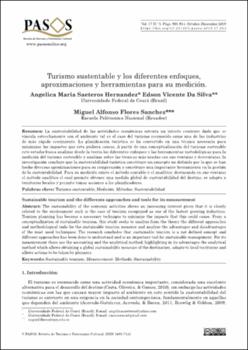Turismo sustentable y los diferentes enfoques, aproximaciones y herramientas para su medición
Fecha
2019Resumen
La sustentabilidad de las actividades económicas ostenta un interés creciente dado que se
vincula estrechamente con el ambiente tal es el caso del turismo reconocido como una de las industrias
de más rápido crecimiento. La planificación turística se ha convertido en una técnica necesaria para
minimizar los impactos que esta pudiera causar. A partir de una conceptualización del turismo sostenible
este estudio busca analizar desde la teoría los diferentes enfoques y las herramientas metodológicas para la
medición del turismo sostenible y analizar sobre las técnicas más usadas con sus ventajas y desventajas; la
investigación concluye que la sustentabilidad turística constituye un concepto no definido por lo que se han
hecho diversas aproximaciones para su comprensión y constituye una importante herramienta en la gestión
de la sustentabilidad. Para su medición existe el método contable y el analítico; destacando en sus ventajas
el método analítico el cual permite obtener una medida global de sustentabilidad del destino, se adapta a
territorios locales y permite tomar acciones a los planificadores. The sustainability of the economic activities shows an increasing interest given that it is closely
related to the environment such is the case of tourism recognized as one of the fastest growing industries.
Tourism planning has become a necessary technique to minimize the impacts that this could cause. From a
conceptualization of sustainable tourism, this study seeks to analyze from the theory the different approaches
and methodological tools for the sustainable tourism measure and analyze the advantages and disadvantages
of the most used techniques; The research concludes that sustainable tourism is a not defined concept and
different approaches has been done to understand and is an important tool for sustainable management. For its
measurement there are the accounting and the analytical method; highlighting in its advantages the analytical
method which allows obtaining a global sustainability measure of the destination, adapts to local territories and
allows actions to be taken by planners.





